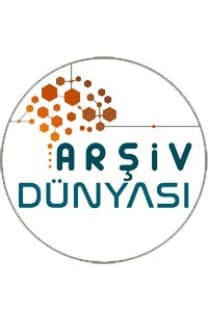Eşiği Geçmek: Dijital Bir Geleceğe
Crossing The Threshold: Into A Digital Future
Records management, archives management digital future,
___
- Senturk, B. (2014) ‘E-Guidelines for the Effectiveness of E-Government Processes’ in Digital Access and E-Government, Perspectives from Emerging and Developing Countries Eds.Peter Sebina, Kgomotso H. Moahi, and Kelvin Joseph Bwalya.
- TNA (2016) The application of technology assisted review to born-digital records transfer, Inquiries and beyond p.9
- Kandur, H. (2015) ‘Setting Standards For Electronic Archiving: The Turkish Public Sector Experience’ presented at International Scientific Conference: Historical And Cultural Heritage: Preservation, Access, Use.
- The National Archives https://www.nationalarchives.gov.uk/information-management/manage-information/policy-process/reviewing-records-management-government/
- Allan A. (2015) Review of Government Digital Records, The Cabinet Office; The National Archives (2016) The digital landscape in government 2014-15 Business intelligence review; and The application of technology assisted review to born-digital records transfer, Inquiries and beyond (both February 2016). TNA (2016) The application of technology assisted review to born-digital records transfer, Inquiries and beyond, 7-8
- TNA (2016) The digital landscape in government 2014-15 Business intelligence review, 30-31.
- Lemieux, V. ‘The future of archives as networked, decentralised, autonomous and global’. Archival Futures, ed. Caroline Brown, London: Facet, 42.
- Digital Curation Innovation Center, University of Maryland https://dcicblog.umd.edu/cas/
- Marciano, R., Lemieux, V., et al ‘Archival Records and Training in the Age of Big Data’ (2018) in Advances in Librarianship – Re-Envisioning the MLIS: Perspectives on the Future of Library and Information Science Education https://dcicblog.umd.edu/cas/ieee-big-data-2019-4th-cas-workshop/
- ISSN: 2147-2599
- Yayın Aralığı: Yılda 2 Sayı
- Başlangıç: 1999
- Yayıncı: Türk Arşivciler Derneği
Osmanlı Ve Cumhuriyet Dönemi’nde Arşiv İdaresi, Arşivcilik Ve İlk Tasnif Çalışmaları
Bilgi Saklama Süreçlerinde Yapay Zekâ Sistemlerinin Kullanımına Yönelik Risk Değerlendirmesi
Türk Arşivciler Derneği Başkanı Mehmet Akif Terzi İle Röportaj
Benay ÖZBENT, Safiye BAYIKOĞLU
Arşivlerde Tanımlama Ve Üstveri: Osmanlı Dönemi Belgeleri
2. Uluslararası Çocuk Kütüphaneleri Sempozyumu Yapıldı
Arşiv-Hafıza-Kamusal Ensefalizasyon
4. E-Beyas Sempozyumu Bu Yıl 10-11 Ekim 2019 Tarihleri Arasinda Ankara’da Gerçekleştirildi
Kuvve-i Hafizadan Yapay Zekâya: Dijital Gelecekte Arşivler Ve Arşivciler
Hatice OLGUN, Buşranur KARAPINAR
